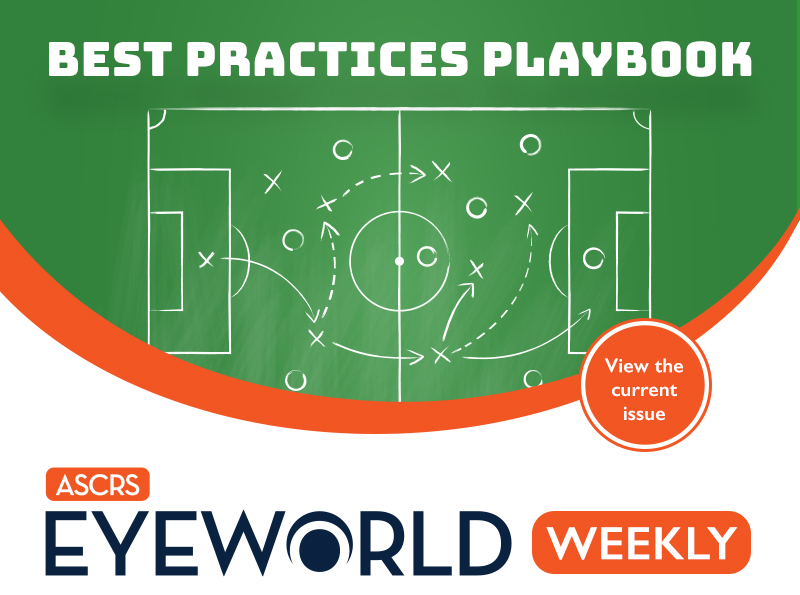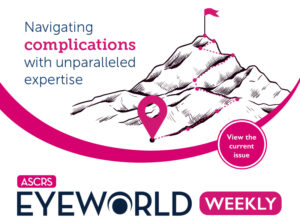
- Phase 1/2 trial to evaluate intravitreal implant to delay cataract progression
- Update from Phase 1/2 proof-of-concept trial for chronic TED treatment
- First patient dosed for investigational, oral geographic atrophy treatment
- Pediatric study for pain, inflammation treatment following ocular surgery
- Complimentary access to video journal
- ASCRS news and events
July 14, 2023 • Volume 29, Number 28
Phase 1/2 trial to evaluate intravitreal implant to delay cataract progression
Nacuity Pharmaceuticals announced the addition of a clinical trial site for its Phase 1/2 study evaluating NPI-002, an antioxidant molecule delivered in a sustained-release intravitreal implant intended to delay cataract progression for patients having vitrectomy. The first cohort in the study, according to the company’s press release, will enroll 30 patients (full enrollment expected by the third quarter of 2023). The company reported that it expects clinical proof-of-concept data in 2024.
Update from Phase 1/2 proof-of-concept trial for chronic TED treatment
Viridian Therapeutics announced positive data from its ongoing Phase 1/2 trial of VRDN-001 for patients with chronic thyroid eye disease. VRD-001 is an investigational full antagonist antibody to an insulin-like growth factor 1 receptor (IGF-1R), which the company describes as a clinically and commercially validated target for the treatment of thyroid eye disease. In the proof-of-concept portion of the trial, two infusions of the therapy were administered via IV 3 weeks apart with cohorts receiving different doses (10 mg/kg, 3 mg/kg, and placebo). According to the company, the drug was well tolerated at both treatment doses with no serious adverse events. Patients in the VRD-001 groups had less proptosis compared to placebo and had reduced clinical activity scores. The company also provided updates from its Phase 3 clinical trial for patients with active thyroid eye disease and its research on drug candidates for subcutaneous injection.
First patient dosed for investigational, oral geographic atrophy treatment
Cognition Therapeutics announced the dosing of its first patient in its Phase 2 study evaluating CT1812, an oral therapy to treat geographic atrophy secondary to dry AMD. According to the company’s press release, CT1812 is a sigma-2 receptor modulator that can penetrate the blood-retinal barrier and bind to the sigma-2 receptor complex, which is involved in regulation of cell processes that are damaged by several known stressors and conditions. The company’s clinical program for CT1812 is designed to evaluate whether the regulation of these cellular processes can maintain normal function of these cells impacted by AMD. The Phase 2 trial is expected to enroll 246 adult participants. The oral therapy is currently designed to be taken once daily.
Pediatric study for pain, inflammation treatment following ocular surgery
Salvat Laboratories announced that it is beginning a pediatric study of its topical ophthalmic corticosteroid SVT-15473 (clobetasol nanoemulsion) for treatment of pain and inflammation following ocular surgery. The study will take place at European trial sites and will enroll 60 patients 0–3 years of age undergoing cataract surgery. Patients will be randomized to receive prednisolone as the control or SVT-15473. The study has already enrolled and treated four pediatric patients. A Phase 3 clinical trial of SVT-15473 confirmed safety and efficacy of the clobetasol formulation in an adult population.
Complimentary access to video journal
The latest issue of the Video Journal of Cataract, Refractive, & Glaucoma Surgery, founded and edited by Robert Osher, MD, is online now.
ASCRS news and events
- ASCRS Summer Meeting: Save your seat at the ASCRS Summer Meeting in Nashville, Tennessee, August 11–13. Reserve your hotel room by July 14 to receive the discounted meeting rate.
- ASCRS Grand Rounds: A new episode of ASCRS Grand Rounds, presented by the Dean McGee Eye Institute, is available online now.
- ASCRS Joint Committee Webinar: The ASCRS Retina Clinical Committee and the Challenging/Complicated Cataract Surgery Subcommittee collaborated to produce an informative discussion on complex cataract cases with retina pathology or history of retina surgery.
Research highlights
- The use of blue-light filtering IOLs were not associated with onset of mental or behavioral disorders or other diseases of the nervous system, a study published in the Journal of Cataract & Refractive Surgery found. Karesvuo et al. analyzed the onset of new mental/behavioral disorders and nervous system diseases in patients who received bilateral non-blue-light filtering IOLs and those who received bilateral blue-light filtering IOLs in a retrospective registry-based cohort study. Patients (2,609 received non-blue-light filtering IOLs and 2,377 received blue-light filtering IOLs) included in the analysis had cataract surgery between September 2007 and December 2018 and were followed through December 2021. The authors reported that there was no association in overall onset of new disorders or diseases associated with either IOL type, except in sleep disorders among those who didn’t have blue-light filtering. The advantage of blue-light filtering IOLs against development of sleep disorders was not statistically significant, the authors reported.
- A study published in the journal Eye evaluated 12-month efficacy of XEN45 (Allergan) as a standalone procedure or in combination with phacoemulsification cataract surgery for patients with glaucoma. The multicenter study included 239 eyes of 239 patients, 144 received XEN standalone and 95 in combination with cataract surgery. The authors defined surgical success as an IOP of less than 18 mm Hg and an at least 20% reduction from preop IOP over 1 year followup. According to the paper, 70.3% of eyes achieved surgical success; there was not a statistically significant difference in success among the two study groups. Mean number of glaucoma medications was reduced from 2.7±0.9 to 0.5±0.9 at 12 months postop. The authors reported surgery failure was associated with an IOP of 15 mm Hg or less preop and temporal position of the surgeon. Complications within the first month postop occurred in 38.1% of cases, and 23.4% of cases experienced a late complication (after 1 month postop). All complications were self-limiting or successfully treated, according to the investigators. Needling was needed at least once during the follow-up period for 23% of cases. The authors concluded that XEN45 alone or in combination with cataract surgery had similar success rates and glaucoma drop usage postop.
Product news
- The Therapeutic Goods Administration of Australia accepted the NDA submitted for Arcatus (ARVN001) by Arctic Vision, which holds an exclusive license for commercialization of the Clearside Biomedical product, which is known as XIPERE in the U.S. (Bausch + Lomb holds the license for commercialization and development in the U.S.).
- Blink over-the-counter eye and contact lens drops from Johnson & Johnson Vision were acquired by Bausch + Lomb.
This issue of EyeWorld Weekly was edited by Stacy Jablonski, Liz Hillman, and Ellen Stodola.
EyeWorld Weekly (ISSN 1089-0319), a digital publication of the American Society of Cataract and Refractive Surgery (ASCRS), is published every Friday, distributed by email, and posted live on Friday.
Medical Editors: Sumit “Sam” Garg, MD, Chief Medical Editor, Mitchell Weikert, MD, Cataract Editor, Karolinne Rocha, MD, PhD, Refractive Editor, Julie Schallhorn, MD, Cornea Editor, Manjool Shah, MD, Glaucoma Editor
For sponsorship opportunities or membership information, contact: ASCRS • 12587 Fair Lakes Circle • Suite 348 • Fairfax, VA 22033 • Phone: 703-591-2220 • Fax: 703-591-0614 • Email: ascrs@ascrs.org
Mention of products or services in EyeWorld Weekly does not constitute an endorsement by ASCRS.
Click here to view our Legal Notice.
Copyright 2023, EyeWorld News Service. All rights reserved.



